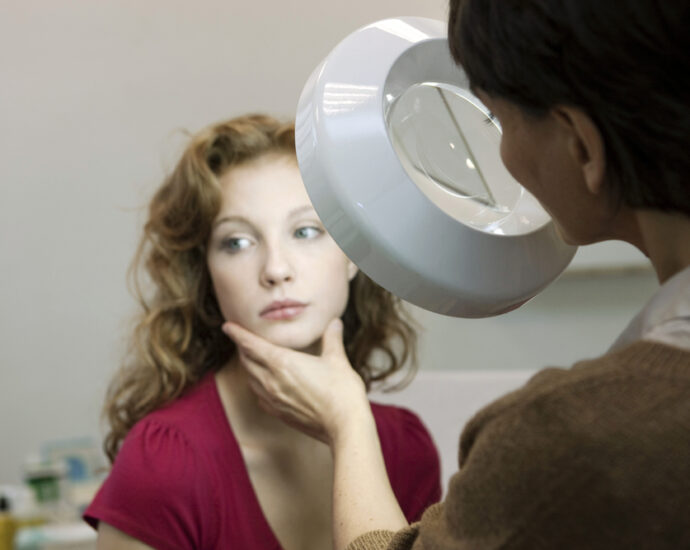Page Contents
What does a dermatologist do?
A dermatologist is a medical specialist who specializes in the diagnosis, treatment, and prevention of skin, hair, nail, and mucous membrane disorders and diseases. Dermatology is a branch of medicine that deals with a wide range of conditions related to the skin and its appendages.
Here’s a breakdown of what a dermatologist does:
- Diagnosis: Dermatologists are trained to diagnose various skin conditions and diseases. They use their expertise to identify the underlying causes of skin problems, often through visual examination, medical history, and, in some cases, diagnostic tests like biopsies or skin cultures.
- Treatment: Once a dermatologist diagnoses a skin issue, they provide treatment options. This can include prescribing medications (e.g., topical creams, oral antibiotics, or antifungal drugs), performing procedures (e.g., surgery, laser therapy, or chemical peels), or recommending lifestyle changes to manage or cure the condition.
- Skin Cancer Screening: Dermatologists play a critical role in detecting and treating skin cancers, including melanoma, basal cell carcinoma, and squamous cell carcinoma. They perform skin cancer screenings and biopsies and can guide patients through treatment options if cancer is detected.
- Cosmetic Procedures: Some dermatologists specialize in cosmetic dermatology. They offer treatments such as Botox injections, dermal fillers, chemical peels, and laser therapy to improve the appearance of the skin, reduce signs of aging, or address cosmetic concerns.
- Chronic Skin Conditions: Dermatologists manage chronic skin conditions like eczema, psoriasis, acne, rosacea, and autoimmune skin disorders. They help patients develop long-term management strategies to control symptoms and improve quality of life.
- Hair and Nail Disorders: Dermatologists also diagnose and treat conditions affecting the hair and nails. This includes conditions like alopecia (hair loss), fungal nail infections, and ingrown toenails.
- Education and Prevention: Dermatologists educate patients about proper skincare practices, sun protection, and skin cancer prevention. They may also recommend appropriate skincare products and routines.
- Surgical Procedures: In cases of skin cancer or other skin issues requiring surgical intervention, dermatologists perform procedures like excisions, Mohs surgery (a specialized technique for skin cancer removal), and reconstructive surgery.
- Pediatric Dermatology: Some dermatologists specialize in pediatric dermatology, focusing on the unique skin issues that affect infants, children, and teenagers.
Overall, dermatologists are essential healthcare providers who help patients maintain healthy skin, diagnose and treat skin conditions, and provide guidance on skincare and preventive measures. If you have any specific questions about dermatology or related topics, please feel free to ask!
When should you go to a dermatologist?
Visiting a dermatologist is important for various reasons, and it’s not limited to treating existing skin problems. Here are several situations when you should consider making an appointment with a dermatologist:
- Skin Issues: If you have any unusual or persistent skin symptoms, such as rashes, redness, itching, sores, moles that change in size or color, or any other skin abnormalities, it’s advisable to see a dermatologist for proper evaluation and diagnosis.
- Acne: Dermatologists can help you manage acne, especially if it’s severe, persistent, or causing scarring. They can recommend treatment options beyond over-the-counter products.
- Skin Cancer Screening: Regular skin cancer screenings are essential, especially if you have a family history of skin cancer, numerous moles, or a history of significant sun exposure. Early detection of skin cancer can greatly improve outcomes.
- Hair and Scalp Issues: If you’re experiencing hair loss, unusual changes in your hair texture, or scalp problems like dandruff, it’s a good idea to consult a dermatologist who specializes in hair and scalp conditions.
- Nail Problems: Persistent nail issues, such as fungal infections, changes in nail color or texture, or ingrown nails, should be assessed and treated by a dermatologist.
- Chronic Skin Conditions: If you have chronic skin conditions like eczema, psoriasis, or rosacea, a dermatologist can help you manage and find effective treatment options.
- Cosmetic Concerns: If you’re interested in cosmetic procedures to improve your skin’s appearance, such as Botox, dermal fillers, chemical peels, or laser therapy, consult a dermatologist who specializes in cosmetic dermatology.
- Preventive Care: Even if you don’t have any current skin concerns, a dermatologist can provide guidance on skincare practices, sun protection, and early signs of skin issues to watch for.
- Mole Checks: Regularly monitor moles on your body, and if you notice changes in their size, color, shape, or if they become itchy or bleed, see a dermatologist for a mole check.
- Aging Skin: If you’re concerned about signs of aging such as wrinkles, fine lines, or age spots, a dermatologist can offer advice and treatments to address these concerns.
- Skin Allergies: If you suspect you have allergies that affect your skin (contact dermatitis or hives, for example), a dermatologist can help identify triggers and provide treatment options.
- Teenagers: Adolescents who are experiencing acne or other skin issues should see a dermatologist for proper evaluation and guidance.
Remember that preventive care and early intervention are key to maintaining healthy skin and catching potential issues before they become more serious. If you’re unsure whether you should see a dermatologist, it’s a good idea to schedule an appointment for a general skin check to discuss any concerns or questions you may have.
Sources:
https://www.aad.org/public/fad/what-is-a-derm#:~:text=A%20dermatologist%20is%20a%20medical,skin%20is%20an%20incredible%20organ.
https://dermrealm.com/chronic-skin-conditions
https://www.hopkinsmedicine.org/health/conditions-and-diseases/skin-conditions
